New Delhi, Sep 2: Normal life was hit in many states on Wednesday as millions of industrial and blue collar employees struck work in the first nationwide protest since Prime Minister Narendra Modi took power more than a year ago.
Leaders of central trade unions which called the day-long strike claimed "unprecedented success" as banks, insurance companies and state-run as well as private factories shut across the country. Transport unions and traders too joined the protest in many places, leading to the closure of educational institutions and thin attendance in government offices.
"The response has been unprecedented," veteran union leader Gurudas Dasgupta from the All India Trade Union Congress said. "In Delhi we are seeing such an impact for the first time. We didn't expect this."
The strike is in support of 12 demands, including withdrawal of labour law amendments, a minimum wage of Rs.15,000 a month and against privatisation of public sector units. Unions said about 300 million workers were involved in the protest.
The strike was largely peaceful except in parts of West Bengal where clashes were reported in Murshidabad, Howrah and North 24 Parganas between Left activists and members of the ruling Trinamool Congress.
Financial services were hit hard as lakhs of bank and insurance employees - including those from cooperative banks and regional rural banks - joined the strike, All India Bank Employees Association general secretary C.H. Venkatachalam told IANS in Chennai.
He said the strike was a success in major cities like Mumbai, the country's financial capital, as well as New Delhi, Chennai and Kolkata.
But unions in State Bank of India and Indian Overseas Bank did not take part. In Mumbai, union leader V. Utagi said: "The strike in the banking and financial services sector is near total. Work at Mumbai Port Trust is hit. And Maharashtra's 1.50 million government employees have joined us."
But public buses and Mumbai's suburban trains plied though their unions lent "moral support" to the strike. A section of cabs and auto-rickshaws in Mumbai also joined the strike, which Utagi said was "a major success".
In Delhi, banks, insurance companies and industrial areas observed a shutdown. Most auto-rickshaws, the poor man's taxi, went off the roads. But Delhi Metro reported normal operations.
The strike hit hard life in Kerala, a Left bastion. Most IT firms in Technopark and Infopark reported very thin attendance. Work at the Cochin Port was affected.
The shutdown evoked mixed response in Karnataka. Buses and autos didn't ply while factories, banks and shops were closed. Thousands of commuters were stranded in cities and towns across the state.
The strike hit transport and banking services in both Telangana and Andhra Pradesh too.
Buses of state-owned road transport corporations in both states went off the roads as did auto-rickshaws in Hyderabad and other towns. Truck owners and drivers also joined the strike in some places. Petrol bunks were shut in a few places.
In Bhopal, all state-run public buses remained off the roads. Shops and banks too were shut. The strike was particularly effective in major cities like Indore, Jabalpur and Ujjain.
Normal life was hit in Bihar as thousands of workers in the government and private sector joined the strike. In some places, strike supporters blocked roads and halted train services.
The strike was total in Left-ruled Tripura. All offices, shops, markets, banks and educational institutions were shut while vehicular traffic went off the roads. In Kolkata, while educational institutions and commercial establishments were largely closed, buses and the metro operated normally. But there were fewer commuters.
Train services on the Eastern Railway and South Eastern Railway were hit as strike supporters blocked the tracks in several areas.
The strike had the least effect in Tamil Nadu although life was hit in industrial areas besides banks and insurance companies.
The impact of the shutdown in Himachal Pradesh was seen in Shimla, Rampur, Theog, Solan, Mandi, Nahan, Una, Bilaspur, Hamirpur, Dharamsala, Palampur, Kangra, Kullu and Manali towns as bus operators joined the protest.
In Goa, markets and public transport were hit hard, union leaders said. Police arrested about 200 workers who had blocked National Highway 17 near the Verna Industrial estate, 25 km from Panaji.
Earlier Report
Normal life hit across India as 15 crore workers go on strike
New Delhi, Sep 2: Normal life was affected in various parts of the country, including in West Bengal and Kerala, as 10 central trade unions today went on a day-long nationwide strike to protest against changes in labour laws and privatisation of PSUs.
BJP-backed BMS and NFITU however stayed away from the strike.
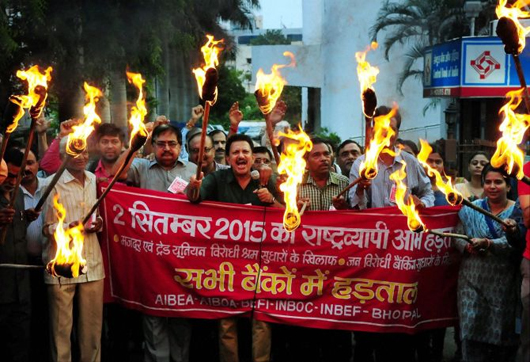
Trade union leaders claimed that around 15 crore formal sector workers are on strike in support of their 12-point charter of demands.
The day long strike was seen affecting transport and banking operations among other services.
In Kolkata, partial impact was seen on suburban trains while shops, markets and business establishments in most areas remained closed.
State administration was plying a large fleet of public buses while partial impact was seen on operations of private buses and taxis.
In the National Capital, commuters faced problems as a large number of autos and taxis remained off the roads.
In Kerala, public and private bus services, taxis and autorickshaws were off the roads. Only few private cars and two wheelers were seen on the roads.
Shops, hotels and even small tea stalls were closed in the state.
The government had yesterday appealed trade unions call off the agitation in the interest of workers and nation.
The unions however decided to go ahead with strike as their talks with a ministerial panel headed by Finance Minister Arun Jaitley last month did not make any headway on their 12-point charter of demands.
Trade unions' 12-point charter of demands includes urgent measures to contain price rise, contain unemployment, strict enforcement of basic labour laws, universal social security cover for all workers and minimum wage of Rs 15,000 per month.
They are also demanding enhanced pension for workers, stoppage of disinvestment in PSUs, stoppage of contractorisation, removal of ceiling on bonus and provident fund, compulsory registration of trade unions within 45 days, no amendment to labour laws unilaterally, stopping of FDI in Railways, Defence etc.
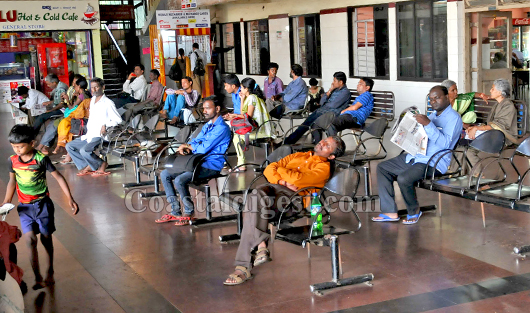
Earlier Report
Banking, transportation hit as 15 crore workers go on strike
New Delhi, Sep 2: Essential services like banking and public transport may be impacted today with ten central trade unions going ahead with their one-day nationwide strike, even as the government appealed to them for calling off the agitation, which BJP-backed Bharatiya Mazdoor Sangh (BMS) and National Front of Trade Unions (NFITU) decided to boycott.
While these ten unions claim to have a combined membership of 15 crore workers in public and private sector, including banks and insurance companies, several outfits representing informal sector workers also today announced their support to the strike.
Labour Minister Bandaru Dattatreya, however, said he expects the impact to be minimal.
"I don't think essential services will be affected by the strike. I feel that the impact will not be much. I appeal them to call off strike in the interest of workers and nation," Mr Dattatreya told reporters here.
The union leaders, however, said the strike will affect the functioning of essential services like banking, transport and supply of power, gas and oil.
Countering this claim, BMS said that power, oil and gas supplies will not be affected as a large number of public sector workers in these areas would not participate in the industrial action.
As many as 12 central trade unions had given this strike call over a 12-points charter of demands, including withdrawal of the proposed changes in the labour laws and stopping the disinvestment and privatisation of PSUs.
While as many as ten central unions have decided to go ahead with the strike after their talks with a group of senior ministers last week failed to yield desired results, the BMS pulled out saying the government needed to be given time to fulfill its promises on the basic demands. NFITU will also stay out.
The government also indicated that the talks with trade unions will continue even if they go on the strike tomorrow.
On impact of the strike, Mr Dattatreya said, "The BMS and NFITU are not in the strike. Besides there are 2-4 organisations (unions) which are neutral." He did not reveal the names of the 'neutral' trade unions.
He further said, "We don't want any confrontation with trade unions. The workers' rights and interests are supreme to us. We will continue talks with trade unions even after tomorrow's strike."




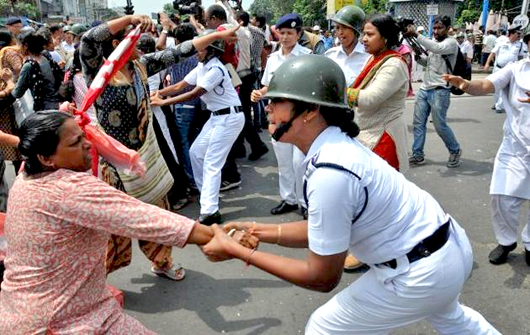
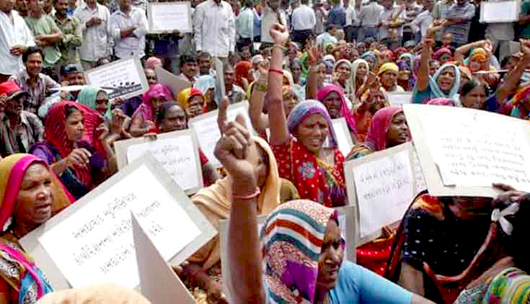
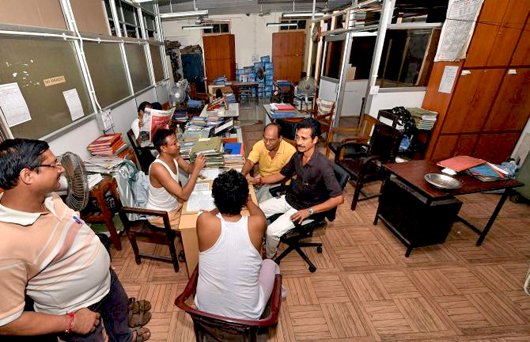
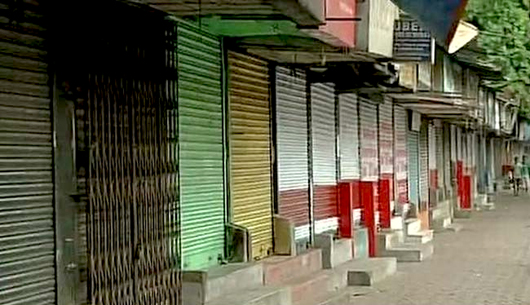
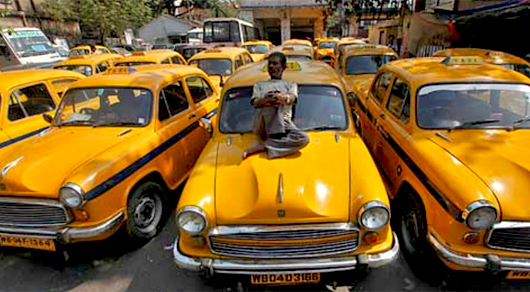
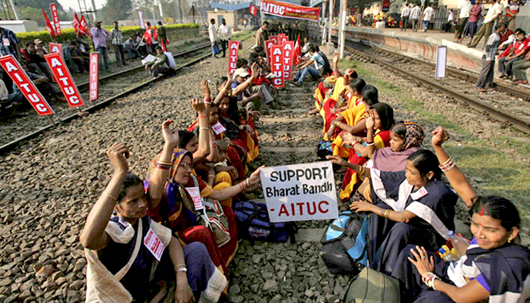
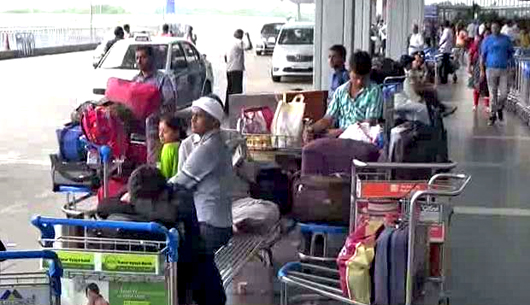



Comments
Hi! I just wanted to ask if you ever have any issues with hackers?
My last blog (wordpress) was hacked and I ended up losing many months of hard work due to no backup.
Do you have any solutions to stop hackers?
my web site - ca car transport: http://photographerforum.org/home.php?mod=space&uid=20142&do=profile&fr…
Hey there! I know this is sort of off-topic but I had to ask.
Does running a well-established blog such as yours take a
massive amount work? I am completely new to running a blog but I do write in my journal daily.
I'd like to start a blog so I can easily share my own experience and thoughts
online. Please let me know if you have any ideas or tips for brand
new aspiring bloggers. Appreciate it!
Review my blog post - ebay auto movers: http://foreignaffairs.gov.mw/index.php/component/k2/item/42-2013-sadc-g…
Add new comment